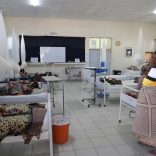JICA Mozambique delegation visits FCM in Campinas, Brazil, to discuss cooperation in medical ...
PGR supports different treatment for foreign doctors not enrolled at OrMM and bogus doctors – Mozambique

File
Mozambique’s Attorney General’s Office (PGR) advocates different treatment for physicians duly recognised by national institutions but not enrolled in the Order of Doctors of Mozambique (ORMM) and those performed by unqualified people masquerading as doctors.
According to the PGR Criminal Department advisor Afonso Antunes, it is urgent to differentiate because a qualified doctor still has the potential to enroll in OrMM, something that unqualified people will never be able to do.
Speaking to the press at a one-day PGR-OrMM seminar in Maputo yesterday, Antunes said that there is some confusion because the law that creates the Order conflicts with the Statute of Physicians in relation to the practice of private medicine in Mozambique.
“There is some confusion about the distinction between the two situations and the legislation itself and the interpretation of article 556 of the current Penal Code. We cannot equate and punish in the same way an individual who does not have the qualifications to practice medicine as the one who has qualifications but is not inscribed in the order,” he explained.
The law establishes a penalty ranging from six months to two years in prison for the exercise of the function without qualifications, but does not provide any penalty for those who are recognized physicians but are not enrolled in OrMM.
In general, associations have a tendency to defend corporate interests, Antunes acknowledged, noting that there are doctors contracted under cooperation agreements between governments to practice medicine in Mozambique who may not necessarily registered in the Order.
“Now it is necessary to establish whether a doctor who arrives under cooperation agreements, with qualifications recognised by the Ministries of Health and Education, needs to be enrolled in the Order,” he said.
The doctor who comes here under such an agreement is prohibited by law from practicing private medicine, but can work in a hospital without being enrolled in OrMM, according to Antunes.
To eliminate these inconsistencies, Antunes proposes to debates and, if necessary, amend the law that creating the OrMM.
Regarding medical errors, Antunes said that all invasive medical action can be considered bodily harm consented to by the patient, and there may be errors caused by negligence.
The law provides for disciplinary and criminal penalties in these cases if the mistake is made through negligence, but it was necessary to discriminate between negligence and error, Antunes said, acknowledging that there are some cases where this is difficult.
In addition to strengthening institutional cooperation and coordination between the PGR and OrMM and other state bodies, civil society and partners, the seminar aimed to analyse and discuss the legal practice of medicine, standardising procedures for judges, prosecutors, and investigators from the National Criminal Investigation Service.













Leave a Reply
Be the First to Comment!
You must be logged in to post a comment.
You must be logged in to post a comment.